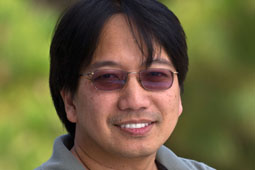The Marine Science Institute with NIMBB and PGC is hosting a talk on August 3, Friday, by Dr. Albert Flavier a Balik Scientist from the University of Houston.
Date: Friday, 03 August 2018, 10:30 am (Manila Time)
Albert Flavier, PhD
University of Houston | Discovery and Development of Health Products Project, DOST
About this talk
Dr. Flavier’s PhD research resulted in the discovery of a novel chemical required for full virulence of the bacterium, Ralstonia solanacearum. He conducted post-doctoral research at the agricultural biotechnology company, Syngenta Corporation, where he discovered new genes from the bacterium, Pseudomonas fluorescens, involved in the synthesis of a fungicidal compound. He contributed significantly to the sequencing of the first completed genome of a fungal plant pathogen. He later worked at Diversa Corporation on developing a P. fluorescens strain and vectors for the discovery of antifungal genes and industrial enzymes, using Diversa’s main technology platform that involved isolation of DNA directly from diverse environments without culturing the organisms, thereby enabling capture of genes from otherwise non-culturable micro-organisms. At Diversa, his team constructed vectors, and designed antimicrobial high throughput bioassays that led to the successful discovery of at least four novel antifungal gene clusters, and one new chemical entity. He also developed P. fluorescens as a host for producing industrial proteins from metagenomic libraries. These include proteins that are now commercialized like Luminase for paper bleaching, Cottonase for “stone washing” textiles, and Purifina for oil refining. After Diversa, he worked at Biogen-Idec – Molecular Discovery group where he engineered and optimized the production of antibody fragments for use as oncology or immunology drugs. He had first-hand experience in producing scFvs, cytokines, growth factors, and kinases, mainly in the yeast, Pichia pastoris, and E. coli. He performed stability, affinity, and expression engineering of the various proteins.
The seminar will be held at NIMBB, rm 105.

